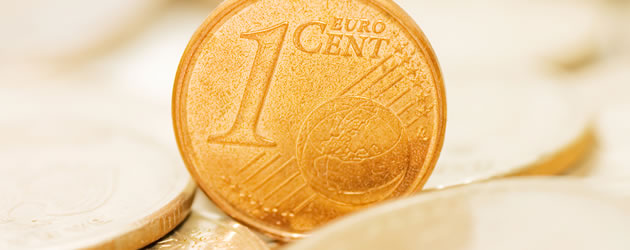BRC Sales Figures Show Soft December for UK Retailers
Figures from the British Retail Consortium (BRC) have shown that December was a disappointing month for UK retailers, with sales growing just 0.1% year-on-year (YoY), despite a forecast increase of 0.5%. Fierce competition and deep discounts meant that total sales rose just 1.0% month-on-month (MoM). While sales figures didn’t particularly growth, concerns that the UK’s economic recovery is too heavily reliant on consumer spending continued to rise.
Poor industrial and manufacturing production statistics have added to the UK’s woes. Industrial Production dropped from 1.7% to 0.9% year-on-year (YoY) instead of remaining steady as forecast, while Manufacturing Production continued to fall, with the decline accelerating from -0.2% to -1.2% YoY in November.
Yesterday…
Leading Indicators Show Steady Eurozone Growth
The Organization for Economic Cooperation and Development (OECD), a research body based in Paris, has released its Composite Leading Indicators, which measure future economic activity. Based upon data available in November, the indicators suggest that the UK, US and Russian economies are set to slow, while the Eurozone will experience a steady rate of growth. Particularly good news for the Eurozone is the fact that the leading indicators for France point to economic acceleration, which will be welcome news considering the contractions currently experienced by many economic sectors. The Euro Area (EA) indicator remained at 100.3, while the indicator for the UK slipped from 99.3 in October to 99.1 in November.
Euro (EUR) Harmed by Plummeting Investor Confidence
A survey of 1,600 financial analysts has found that confidence in the Eurozone dropped dramatically in December. The Sentix Investor Confidence index plummeted from 15.7 past the predicted 11.4 mark to hit 9.6, suggesting a significant increase in pessimism. A year-on-year comparison softens the blow from the data as the index was at 0.9 in January 2015, although the drop is still concerning, especially considering confidence has steadily fallen after peaking at 20.0 in April.
Earlier…
Another turbulent day of trading on the Chinese stock market has seen the Eurozone, China’s biggest export partner, on tenterhooks. The EUR/GBP exchange rate has slumped following another day of poor trading in Shanghai, while Pound Sterling is currently strong despite fears over the fate of the UK manufacturing sector.
China Benchmark Stock Index Falls -5%: EUR/GBP Slides Amid Infectious Investor Pessimism
After a small reprieve from the dramatic sell-offs last week, the Chinese stock market has closed down -5.3% again as China’s financial stability continues to be the main source of doubt among investors and economists. The turmoil saw over £1.4 trillion wiped from the value of global equities in just the first four trading days of 2016, with European stock markets following the Chinese lead to see London down -5.3%, Paris -6.5% and Frankfurt -8.3%. Chinese authorities had introduced a new ‘circuit breaker’ mechanism which was designed to prevent volatility in the markets by suspending trade should stocks drop by -5% in a single day. The mechanism was activated twice within the first four days of trading and the first week of being implemented, as investors rushed to sell before it was activated.
The authorities have since suspended the mechanism in the hope that it would prevent a repeat of last week’s twin -7% drops in share values which forced the Chinese stock markets to close early. While volatility does seem to have been curbed slightly, the fact that the Shanghai index closed down -5.3% today suggests that investor concerns haven’t been addressed. China and the EU both account for the largest source of each other’s imports, while Chinese investment in the Eurozone has been steadily on the rise. Therefore, the slowdown in the Chinese economy could have a significant economy impact upon the Eurozone, especially during its current fragile state.
The EUR/GBP exchange rate is currently trending down -0.7% and trading around 0.7472.
GBP/EUR Exchange Rate Bullish as Euro Suffers Over China Fears
Pound Sterling has been able to make significant advances on the Euro (GBP/EUR) thanks to the softer impact of China’s market woes upon London stocks than European ones. Pound Sterling hasn’t been in a particularly strong position as 2016 starts, with concerns over a flagging manufacturing sector, the damage from the December flooding, George Osborne’s economic warnings and a worse-than-expected trade deficit all weighing on the British asset. However, it seems that the UK stock market has escaped the worst of the panic spreading from China, with the FTSE 100 index holding opening levels and the FTSE 250 down -0.4%, indicating investors are still selling stocks, but not at the same lightning pace seen in other world markets.
Pound Sterling is currently enjoying gains against most of the major currencies and the GBP/EUR exchange rate is trending up 0.7% between 1.3252 and 1.3405.
Euro to Pound Sterling (EUR/GBP) Exchange Rate Forecast: Central Banker Speeches Predicted to Move Currency Tomorrow
There is little data due for either the Eurozone or the UK today. The European Central Bank (ECB)’s Peter Praet and Sabine Lautenschläger, along with the Bank of England (BoE) Governor Mark Carney are all due to speak tomorrow at a farewell symposium for current Banque de France Governor Christian Noyer. The currency markets usually find something to respond to whenever a central banker speaks publicly.
The EUR/GBP exchange rate is currently trending between 0.7458 and 0.7540.



